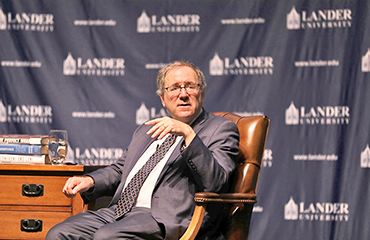
With the advent of the internet, warfare has taken on a whole new dimension, according to David Sanger, national security correspondent for The New York Times and author of the book, "The Perfect Weapon: War, Sabotage and Fear in the Cyber Age."
"They will go after our infrastructure, go after our elections, go after our self-confidence, go after our ability to be certain of who is speaking and when. And those are all things that erode American power, without offering a military response," he said.
However, Sanger, who spoke at Lander University on Monday, Jan. 27, would not rule out the possibility of military responses in the future. He compared cyber warfare today with aerial warfare in World War I, which had little to do with the outcome of the war. Twenty-seven years later, planes were carrying nuclear weapons.
Nearly everything is connected nowadays, and that can sometimes be a problem. "Every one of those internet-connected devices that you're using at home or at the office is making your life easier, and every one of them is another potential pathway into the network," he said.
The small investment required to launch cyberattacks means that almost anybody can get in on the action. "If you're going to build cyberweapons, you need some laptops, some stolen code from the National Security Agency, some millennials, some pizza, a little Red Bull to stay up all night, and you're good," he said.
The many potential targets of cyberattacks include power grids, gas pipelines and water systems. The Chinese J-31 fighter jet is based upon plans for the American-made F-35 fighter jet that were stolen by Chinese hackers. Sanger, who appeared at Lander as part of the Larry A. Jackson Lecture Series, called it "an interesting way to save on your defense budget."
The ability to disguise a cyberattack is another thing that makes it a "perfect weapon." Several years ago, the Chinese stole 22 million files from the United States's Office of Personnel Management, then encrypted the information that had been stolen to throw investigators off. "It took us a year to figure it out," he said. The Russians are poised to meddle in this year's election just as they did four years ago, but their servers are no longer in Red Square. They're in the United States, Sanger said.
Like the Russians and Chinese, Americans have resorted to cyberattacks, too. The U.S. is thought to have been responsible for some of the failed launches of missiles by North Korea several years ago. "Kim Jong-un caught on to it and changed the missiles' design, and has now had a lot greater success rate," he said. Presidents Bush and Obama both authorized cyberattacks against nuclear centrifuges inside Iran, a strategy that "worked beautifully for about two or three years, until one day the code got out."
One of the most worrisome aspects of cyber warfare is the impact it could have on the nuclear standoff between the three superpowers. Sanger visualizes a world in which "nobody's going to be certain that their missiles work, and if they're not certain that their nuclear weapons will work, we suddenly have strategic instability; we don't have mutually assured destruction. It's a complicated problem," he said.
"There are ways out of this," said Sanger, but the solutions are not straightforward. "And the threat is evolving faster than we're keeping up."